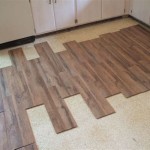Bamboo Flooring: Pros and Cons
Bamboo flooring has risen in popularity as an eco-friendly and aesthetically pleasing alternative to traditional hardwood flooring. But before you make a decision, it's essential to weigh the advantages and disadvantages to determine if it's the right choice for your home.
Pros of Bamboo Flooring:
- Sustainability: Bamboo is a rapidly renewable resource that grows at an extraordinary rate, making it a sustainable choice.
- Hardness and Durability: Bamboo is one of the hardest flooring materials available, resistant to scratches, dents, and wear.
- Dimensional Stability: Bamboo flooring expands and contracts less than traditional hardwood, making it suitable for areas with fluctuating humidity levels.
- Environmental Protection: Bamboo flooring is treated with environmentally friendly coatings, contributing to healthier indoor air quality.
- Design Variety: Bamboo flooring is available in various colors, shades, and textures, offering homeowners a wide range of aesthetic options.
- Ease of Installation: Bamboo flooring is relatively easy to install, using a floating or gluing method.
Cons of Bamboo Flooring:
- Water Susceptibility: Bamboo flooring is not waterproof and can be damaged by spills or excess moisture.
- Fading: Bamboo flooring can fade over time when exposed to direct sunlight.
- Maintenance: Bamboo flooring requires more frequent maintenance than some other flooring types, including regular cleaning and resealing.
- Potential Allergic Reactions: Some individuals may experience allergic reactions to bamboo flooring, especially those with known allergies to grass or other plant materials.
- Cost: Bamboo flooring can be more expensive than traditional hardwood flooring, depending on the style and quality.
Additional Considerations:
- Species of Bamboo: Different bamboo species have varying levels of hardness and durability. Choose a species known for its performance in high-traffic areas.
- Finish Type: The finish of the bamboo flooring affects its appearance, durability, and maintenance requirements.
- Installation Method: The floating method is suitable for DIY installation, while gluing requires professional installation.
- Warranty: Look for bamboo flooring with a comprehensive warranty that covers defects and premature wear.
Conclusion:
Bamboo flooring offers several advantages, including sustainability, hardness, design variety, and ease of installation. However, it also has limitations, such as water susceptibility, fading, and higher maintenance requirements. By understanding these pros and cons, you can make an informed decision about whether bamboo flooring is the right choice for your home.

Bamboo Flooring Pros And Cons Diy Family Handyman

Pros And Cons Of Bamboo Flooring

Pros And Cons Of Bamboo Floors Why We Chose Them For Our House Plaster Disaster

Bamboo Flooring Pros And Cons Forbes Home

The Pros And Cons Of Bamboo Flooring Astrobrite Local Family Run

Kitchen Designs Flooting Strand Woven Tiger Stripe Bamboo Floor Now Read Engineered Flooring Hardwood Laminate

The Pros And Cons Of Bamboo Flooring Carpet Mill S

Pros And Cons Of Bamboo Flooring Advantage Disadvantage
Pros And Cons Hardwood Floors Vs Bamboo Flooring Builder

Posts Tagged Advantages Of Bamboo Flooring The Company
Related Posts








